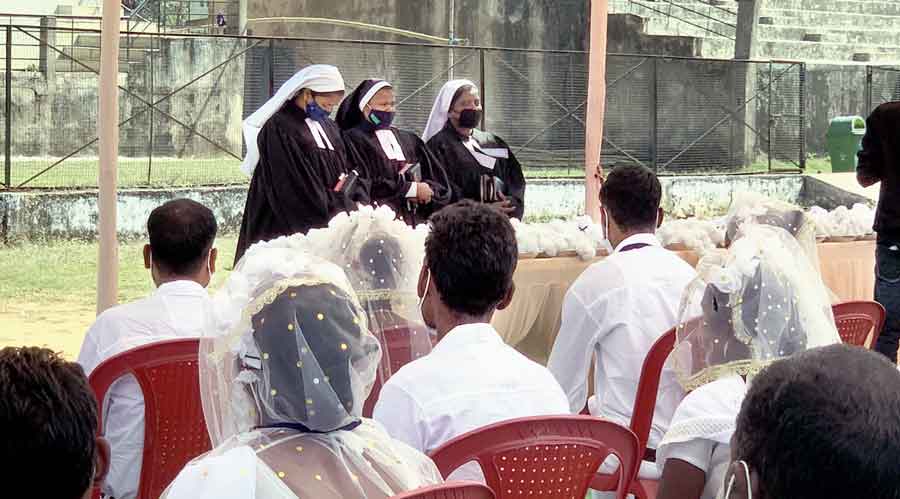A group of tribal couples in Jharkhand who had chosen to be in a live-in relationship, more because of financial constraints, were formally married at the first of a series of functions that began in Khunti on Saturday.
Interestingly, the marriages of those 43 couples — known as dhuku in local parlance — all christians, were solemnised by a group of three women pastors for the first time at a local stadium in Khunti.
“They are among 1,320 such couples who would be formally married in batches as organising such mass marriage ceremony is not possible because of Covid restrictions now,” informed Nikita Sinha, founder of Nimitta, an NGO that has organised marriages of 629 such couples in the past five years.
The administration has asked to organise the marriages in batches of maximum 50 such couples at a time, Nikita — wife of Union rural development secretary N.N. Sinha — said while speaking to The Telegraph, adding that was why they were considering organising the functions at multiple venues across Khunti and Gumla districts.
The dhuku couples remained live-in partners not by choice but because of financial reasons as besides marriage expenses, they had to organise a community feast which they couldn’t afford.
There are many dhuku couples in the countryside who live together for years without getting formally married and even have children who often accompany them when they get formally married at such functions, Nikita said.
These couples are not harassed in their villages but never given social recognition.
While the women, known as dhukins, are not allowed to actively participate in social occasions, their children are also debarred from piercing nose and ears as is the ritual in tribal communities.
In case of death of the men, known as dhukiyas, the women and children are also deprived of whatever little asset they leave behind.
Once Nikita came to know about the plight of such couples a few years ago, she decided to attempt formalising dhuku marriages through their NGO and began doing so.
“I feel relieved that I will now be treated at par with other married women of our village,” said 24-year-old Malira Toppo of Barukuli village — who had been living together with Sumant Toppo — after her formal marriage on Saturday.
“All these couples present today are christians. So we, for the first time, approached the women pastors for solemnising their marriages,” she informed, adding they engage pahans or tribal priests in case of those couples who follow Sarna rituals.
They also gift household items such as utensils to those couples and give them a treat as local troupes often sing and dance on those occasions.
“Companies like Coal India and its subsidiaries CCL and CMPDI, Rail India Technical and Economic Service and Lions Club of Ranchi Capital came forward to help us,” Nikita informed when asked how they managed financing those functions.










